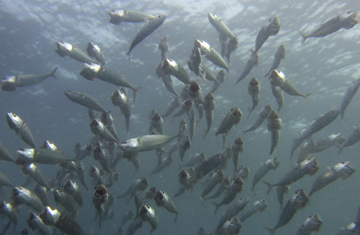
A school of mouth mackerels
The water separating Iceland from the rest of Europe has been choppy these past few years. After Iceland's banks collapsed in 2008, the British government used anti-terrorism laws to force Reykjavik to agree to compensation for U.K. and Dutch account holders. When one of Iceland's many volcanoes spewed an ash cloud westwards in April, it grounded European air traffic for a week. Now there is a new feud between the two and this time it is about the sea itself: Iceland — along with the tiny Faroe Islands nearby — has started trawling for mackerel, a stock that Norway and the E.U. insist is over-fished.
After Iceland unilaterally raised its mackerel quota from 2,000 to 130,000 tons for the year in early August, and the Faroes raised their 25,000-ton quota to 85,000 tons, the outraged Scottish Fisheries Minister Richard Lochhead accused them of "hoovering up" stock, and warned that Iceland was jeopardizing its ambition to join the E.U. Last week, as the so-called mackerel war flared up again, a Faroes-registered trawler was blocked by local fishermen as it attempted to offload its $620,000 catch at the Scottish port of Peterhead. Scottish member of the European Parliament Struan Stevenson has called for an E.U.-wide blockade of Icelandic and Faroese ships. "This is wholly irresponsible and bizarre," says Stevenson. "Iceland and the Faroes are plundering stocks just like their Viking ancestors."
Environmental groups have also chimed in. The World Wide Fund for Nature (WWF) said Aug. 19 that Iceland and the Faroes' combined quotas would result in the fish being exploited 35% above the recommendation set by the International Council for the Exploration of the Sea. WWF added that this would spell a "death sentence" for the region's mackerel population. The Marine Stewardship Council, which issues fishery certification programs, said that if the fishing continued at this rate, mackerel would start to fall below sustainable levels by 2012.
But Iceland insists it's justified in upping its quota. The Federation of Icelandic Fishing Vessel Owners said that it "has every right to fish for mackerel within the Icelandic jurisdiction," while Iceland's fisheries minister Jon Bjarnason dismissed as "preposterous" allegations that it was over-fishing mackerel. Yet the furious reactions from the rest of Europe, and from conservationists, show that the hiked mackerel quotas have put Iceland and the Faroes in hot water.
Mackerel is by no means the only fish stock under pressure, and until recently, it was considered one of the better-managed North Sea stocks. But with fishermen feeling the squeeze across Europe, this row is being seen as a harbinger for bigger fish tiffs to come.
Part of the problem is climate change. The mackerel are seeking colder seas, and have migrated en masse to the more northerly waters around Iceland and the Faroes — whose catch quotas were originally based on the idea that their fishermen wouldn't have access to, or go looking for, mackerel. But it is also due to the overall collapse in many fish stocks in European waters, as innovations such as sonar, driftnets and industrial freezer-trawlers have made fishing too easy, putting many stocks in a vulnerable position. At the same time, policy tools have yet to be applied to prevent over-fishing.
The E.U. has faced particular difficulties in devising policies to parcel up fisheries while keeping a lid on overall catches. In 1983, the E.U. set up its Common Fisheries Policy (CFP), which limits how long a boat can be at sea and sets quotas on how much it can catch. But last year, the European Commission itself admitted that the CFP had failed: In a sobering policy paper, it said too many boats were chasing too few fish, meaning that 88% of commercially caught species were being fished beyond their maximum sustainable yield, compared to 25% elsewhere in the world. The CFP also unintentionally encourages discards or "bycatch," which sees fishermen throwing millions of tons of dead fish back into the sea because they are not a stock the fishermen are authorized to catch. The WWF estimates that while 40,000 tons of cod are landed by E.U. fishermen each year, up to 26,000 tons of cod is discarded. As a result, after years of chronic over-fishing, exacerbated by poor controls and feeble fines, many species — cod and hake, for example — are depleted in certain E.U. waters.
Nonetheless, there is still money in fishing. On Aug. 25, six Scottish trawler skippers admitted to taking part in a $22 million scam to beat quotas on how many fish they could land. "[Fishing] is a multi-million dollar business," says Mike Walker, senior associate at the E.U. Marine Program of the Pew Environment Group. "As long as there is money in it, we can expect more disputes like [the one between Iceland and Europe] over the next few years."
But North Sea and Atlantic fishermen simply don't see their stocks as a finite resource that needs to be nurtured, says Isabella Loevin, a Swedish MEP and author of Silent Seas, a 2007 critique of the CFP. She says that as long as fish is seen as a common good — by the E.U.'s member states, Iceland, and the Faroes — no one has an incentive to restrict how much they take out of the sea. "There are no votes to be won in telling fishermen that they have to cut their catches," she says. "Everyone points their fingers at everyone else and saying, 'If they don't stop fishing, why should we?'"
And unless there is a sea change in fishing — from the industry and governments — squalls like the one between Iceland and Europe are likely to become more frequent.
